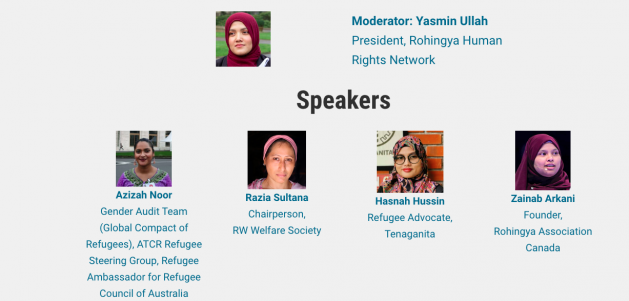Rohingya Women Take a Seat at the Table & Share Stories in a Growing Rights Movement

UNITED NATIONS, Jul 24 (IPS) - Rohingya women are coming together to feature their own work, plight and stories in mainstream conversations about their community — a space they say they've been left out of.
"If we think of revolutions or liberty or think of any ways to liberate ourselves from the shackle of suffering and being dubbed as 'the most persecuted minority on earth', women have to be part of it," Yasmin Ullah, president of the Rohingya Human Rights Network, told IPS.
On Jul. 24, the first ever Rohingya women-only panel, facilitated by Ullah and other organisations, brought together Rohingya women leaders from around the world who shared their experiences and knowledge at the "Her Voices, Her Journey: The Gendered Experiences of Rohingya Women" webinar.
It featured Azizah Noor, a refugee ambassador for the Refugee Council of Australia; Hasnah Hussin, a refugee advocate who works with refugee support organisation Tenaganita in Malaysia; Razia Sultana, chairperson of the RW Welfare Society; and Zainab Arkani, co-founder of the Rohingya Association Canada.
"There are lots of challenges that Rohingya women face such as gender-based violence, societal and community expectations and these are things we need to address in our community," Noor told IPS.
The webinar aimed to provide Rohingya women with the agency to tell their own stories and be included in the larger conversation surrounding Rohingya rights, the genocide and refugee crisis. Rohingya women are often not seen at the forefront of advocacy efforts for the community. Ullah said that often Rohingya women were invited to speak only around a certain narrative, or the same woman speaker would be invited to different events and talks.
According to Reliefweb International's 2018 report, more than 52 percent of Rohingya refugees were women, but that was not reflected in panel talks or rallies for and by Rohingya refugees.
"Not having a proportionate representation of our voices in different discussions at different tables is just so unjust," Ullah said.
Moreover, it risks trapping Rohingya women in a constrictive narrative where they are only seen as victims. Ullah said when more women were included in the conversation about the refugee crisis as well as about the trials of Rohingya women, the narrative would eventually shift to also include their triumphs.
"It's so important for the outside world to see that there are more to Rohingya women than a bunch of suffering women, a bunch of raped women, a bunch of survivors and know nothing about the outside world, there are so many exemplary women out there for their word to be shared, their ideas to be shared," Ullah said.
How a fear perpetuated the invisibility
In many ways the invisibility of Rohingya women in the global movement around the rights of the Rohingya began in Myanmar.
Ullah said many Rohingya women are encouraged to stay home for their own protection against the Myanmar military. Over time, she said, this has normalised Rohingya women's absence in larger political conversations. She added that the deep fear of Myanmar's military attacking Rohingya women lessened their overall participation in society.
Myanmar's military is notorious for sexual violence against Rohingya women, which some experts say is a genocidal tactic used against the ethnic minority.
Ullah said it's so prevalent that the military could just show up to one's door and drag a woman out to rape -- rape survivors have shared their testimony of this.
While Rohingya women are encouraged to always stay indoors for their safety, this creates a shift in the views of the gender roles, which Ullah said are "a direct correlation of the military strategies, tactics and propaganda used on the Rohingya ".
"The traditional value of Rohingya culture has kind of shifted multiple times, and it shifted because there is a lot of fear, insecurity for women being protected," Ullah said. "That's why women are kept home because there are so many things that could go wrong."
"As a result, slowly Rohingya women have receded and became homebound and that turned into the kind of mindset that we see today," she said.
Education and security
Ullah said that when given opportunities and a safe environment, Rohingya women thrive. One such example is Sultana, who documented sexual violence Rohingya women were subject to and received the prestigious International Women of Courage Award in 2019, among others.
"There is so much more to us, so many things that we are able to do, especially when we're given the security granted by the state, human rights, education, access to healthcare, essential services," Ullah said. "Those few things really pushed Rohingya women to excel in their career in their respective field of studies."
Meanwhile, access to education for Rohingya refugees in itself remains a challenge, especially under the pandemic, said Noor, a former Rohingya refugee from Australia.
"Factoring in equity during COVID-19 is extremely important," Noor told IPS. "Refugee families are already struggling with fitting in, and are often marginalised. Technology is something that not all refugee families have and resources are not available for all families."
As for the panel, Ullah said this was the first of many to come and was optimistic about the turnaround for the event.
"The time is now because if we wait 20 to 30 years from now, the damage would already be done and it would be too late for women to even be involved in any of these discussions."
© Inter Press Service (2020) — All Rights Reserved. Original source: Inter Press Service
 Global Issues
Global Issues